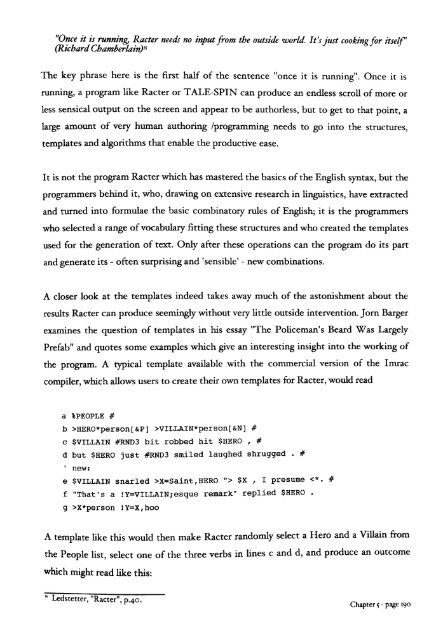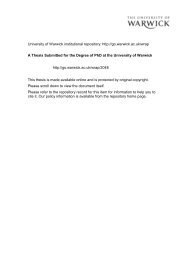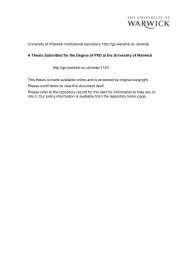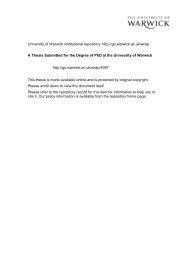From Page to Screen - WRAP: Warwick Research Archive Portal ...
From Page to Screen - WRAP: Warwick Research Archive Portal ...
From Page to Screen - WRAP: Warwick Research Archive Portal ...
Create successful ePaper yourself
Turn your PDF publications into a flip-book with our unique Google optimized e-Paper software.
"Once it is running, Racter needs no input from the outside world. It's just cookingfor itself'<br />
(Richard Chamherlain)J5<br />
The key phrase here is the first half of the sentence "once it is running". Once it is<br />
running, a program like Racter or TALE-SPIN can produce an endless scroll of more or<br />
less sensical output on the screen and appear <strong>to</strong> be authorless, but <strong>to</strong> get <strong>to</strong> that point, a<br />
large amount of very human authoring /programming needs <strong>to</strong> go in<strong>to</strong> the structures,<br />
templates and algorithms that enable the productive ease.<br />
It is not the program Racter which has mastered the basics ofthe English syntax, but the<br />
programmers behind it, who, drawing on extensive research in linguistics, have extracted<br />
and turned in<strong>to</strong> formulae the basic combina<strong>to</strong>ry rules of English; it is the programmers<br />
who selected a range ofvocabulary fitting these structures and who created the templates<br />
used for the generation of text. Only after these operations can the program do its part<br />
and generate its - often surprising and 'sensible' - new combinations.<br />
A closer look at the templates indeed takes away much of the as<strong>to</strong>nishment about the<br />
results Racter can produce seemingly without very little outside intervention. Jorn Barger<br />
examines the question of templates in his essay "The Policeman's Beard Was Largely<br />
Prefab" and quotes some examples which give an interesting insight in<strong>to</strong> the working of<br />
the program. A typical template available with the commercial version of the Imrac<br />
compiler, which allows users <strong>to</strong> create their own templates for Racter, would read<br />
a %PEOPLE #<br />
b >HERO*person[&P] >VILLAIN*person[&N] #<br />
c $VILLAIN #RND3 bit robbed hit $HERO , #<br />
d but $HERO just #RND3 smiled laughed shrugged . #<br />
, new:<br />
e $VILLAIN snarled >x=Saint,HERO It> $X , I presume X*person lY=X,hoo<br />
A template like this would then make Racter randomly select a Hero and a Villain from<br />
the People list, select one of the three verbs in lines c and d, and produce an outcome<br />
which might read like this:<br />
'S Ledstetter, "Racter", P.40 •<br />
Chapter 5 - page 190





